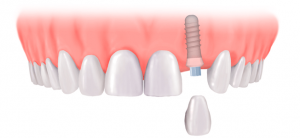A dental implant can be a solution when you have a missing tooth or have lost multiple teeth.
Your tooth is made up of two components; the root (portion below the gum) and the crown (white tooth portion visible above the gum). In a dental implant crown, there are also two components; a dental implant or titanium “root” that is fused to the bone, to which a crown is attached.

When your tooth is lost, its surrounding bone and gum would begin to shrink. Over time, this may result in problems, such as shifting of your other teeth and reduced lip or cheek support. By having a dental implant in place of the missing tooth, and providing that surrounding bone and gum are kept clean and healthy, the above described problems can be minimised.
Dental implants can look and function like a natural tooth, making it easier for you to eat, talk, as well as creating a beautiful smile. Though, this can only be achieved with careful assessment and planning, precision in implant surgery and implant crown construction.
Our clinicians at Perth Prosthodontics will begin the procedure by assessing your gum, bone, nerve and blood vessel supply, and nasal sinus during an oral examination with the aid of 3D imaging (CTScan) and xrays. With the use of advanced digital technology, the most suitable dental implant is selected for your situation and a device “jig” is made for guided implant surgery with absolute precision and safety in mind.
For simple implant placements, a local anaesthetic is given before placing the dental implant into the jaw bone. A healing cap is placed, allowing for gums to heal and for bone to fuse to the dental implant surface, which often takes around 3 months.
Once our clinicians have confirmed successful healing, an impression is then taken to construct the implant crown (bridge, denture etc). An animated video of this procedure can be found on our page. In some instances, the implant crown or bridge can be attached onto dental implant immediately after its placement into the jaw bone.
There are many factors that influence the success and lifespan of a dental implant. When used in optimal situations, dental implants enjoy a high success rate in excess of 95%. However, this means that 1 in 20 implants may fail to fuse with the bone or become loose after a period of use. Higher risk of implant failures has been found in cases where:
there has been poor surgical and prosthetic expertise
in patients with poorly controlled diabetes
uncontrolled gum disease
poor oral hygiene
cancer radiotherapy to jaw bone area
use of bisphosphonate drugs for osteoporosis
long term and heavy smokers
At Perth Prosthodontics, our clinicians are highly trained to balance all pros and cons for you. We do not prescribe implants, if it is not the best solution for you. We take pride in helping our patients to decide if dental implants are the best solution when weighed against other treatment alternatives, which can be more conservative, effective and may even cost less, but can still provide an equally satisfactory result.
Our clinicians are highly trained and their skill is showcased through our portfolio.
More information on what we offer can be found under our treatment page.
Please reach out to our friendly staff to find out more about dental implants; contact us today on 9368 0888.







